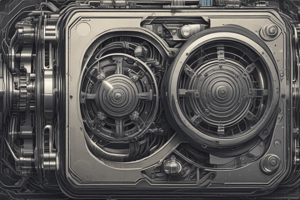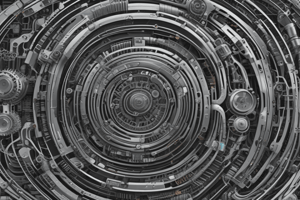Podcast
Questions and Answers
Which type of motor is commonly used in industrial applications due to its robust nature and cost-effectiveness?
Which type of motor is commonly used in industrial applications due to its robust nature and cost-effectiveness?
- Induction motor (correct)
- Synchronous motor
- DC motor
- Alternating current motor
What is the primary principle behind the operation of AC motors?
What is the primary principle behind the operation of AC motors?
- Mechanical friction
- Commutation of current
- Direct current flow
- Electromagnetic induction (correct)
Which of the following is NOT a key component of a DC motor?
Which of the following is NOT a key component of a DC motor?
- Commutator
- Rotor
- Inductor (correct)
- Stator
What determines the speed of an AC motor?
What determines the speed of an AC motor?
What are the primary considerations when selecting a motor for a home appliance?
What are the primary considerations when selecting a motor for a home appliance?
Which characteristic describes the twisting force generated by a motor?
Which characteristic describes the twisting force generated by a motor?
Which type of motor is typically used in applications requiring precise speed control, such as power generation?
Which type of motor is typically used in applications requiring precise speed control, such as power generation?
Which of the following is NOT a factor in determining the suitability of a motor for a home appliance?
Which of the following is NOT a factor in determining the suitability of a motor for a home appliance?
In a DC motor, what causes the rotor to spin?
In a DC motor, what causes the rotor to spin?
What maintenance practices are essential for ensuring the longevity of a motor in a home appliance?
What maintenance practices are essential for ensuring the longevity of a motor in a home appliance?
What is the main objective of inspecting and maintaining a motor in a home appliance?
What is the main objective of inspecting and maintaining a motor in a home appliance?
Which application DOES NOT typically utilize electric motors?
Which application DOES NOT typically utilize electric motors?
Which of the following signs might indicate a potential issue with a motor in a home appliance?
Which of the following signs might indicate a potential issue with a motor in a home appliance?
Flashcards
Electric Motors
Electric Motors
Machines that convert electrical energy into mechanical energy.
DC Motors
DC Motors
Motors that use direct current electricity for operation.
AC Motors
AC Motors
Motors that operate on alternating current electricity.
Induction Motors
Induction Motors
Signup and view all the flashcards
Synchronous Motors
Synchronous Motors
Signup and view all the flashcards
Torque
Torque
Signup and view all the flashcards
Motor Efficiency
Motor Efficiency
Signup and view all the flashcards
Motor Applications
Motor Applications
Signup and view all the flashcards
Motor Selection Criteria
Motor Selection Criteria
Signup and view all the flashcards
Continuous Operation Motors
Continuous Operation Motors
Signup and view all the flashcards
Start/Stop Motors
Start/Stop Motors
Signup and view all the flashcards
Motor Maintenance
Motor Maintenance
Signup and view all the flashcards
Cooling System in Motors
Cooling System in Motors
Signup and view all the flashcards
Study Notes
Types of Motors
- Electric motors convert electrical energy into mechanical energy. Various types exist, each with unique characteristics and applications.
- DC motors utilize direct current electricity.
- AC motors operate on alternating current electricity.
- AC motors are categorized by induction or synchronous principles.
- Induction motors are widely used in industrial applications due to robustness and cost-effectiveness.
- Synchronous motors are frequently used in applications needing precise speed control, such as power generation.
- AC motors are categorized by induction or synchronous principles.
DC Motor Operation
- A DC motor consists of a rotor and a stator.
- The stator creates a magnetic field.
- The rotor, with current-carrying conductors, interacts with the stator's magnetic field, generating torque.
- This torque spins the rotor, transforming electrical energy into mechanical rotation.
- Rotation direction depends on current flow through the rotor windings.
- Essential components include commutators and brushes switching current direction.
- DC motor speed and torque depend on applied voltage, magnetic field strength, and load.
AC Motor Operation
- AC motors, utilizing alternating current, primarily rely on electromagnetic induction.
- The stator houses electromagnets alternating the magnetic field.
- This changing magnetic field induces currents in the rotor, causing rotation.
- AC motors are categorized by rotor construction (e.g., cage or wound).
- Motor speed is determined by the applied AC voltage frequency and the number of poles.
- AC motors are typically more cost-effective and robust for many industrial applications.
Motor Characteristics
- Torque: The twisting force generated by the motor.
- Speed: The rate of rotation of the motor shaft.
- Power: The rate at which the motor performs work.
- Efficiency: The ratio of output power to input power.
- Starting torque: The torque generated at motor startup.
- Load: The resistance the motor overcomes.
- Operating temperature: The temperature a motor can safely manage.
Motor Applications
- Electric vehicles (EVs) and hybrid vehicles rely heavily on DC and AC motors for propulsion.
- Industrial machinery often uses AC motors for tasks like pumping, grinding, and conveyor systems.
- Home appliances frequently incorporate both types of motors.
Motor Selection Criteria
- Appropriate motor type and specifications depend on application requirements.
- Factors considered include required power output, speed control needs, environmental conditions, and cost.
- Some motors are designed for continuous operation, while others for frequent starting and stopping.
Motor Maintenance
- Regular inspection and maintenance are vital for optimal performance and longevity.
- Check for wear (e.g., loose connections, overheating).
- Lubricate moving parts for smooth operation.
- Maintain a clean cooling system to prevent overheating.
- Address unusual sounds or vibrations to detect issues early.
Studying That Suits You
Use AI to generate personalized quizzes and flashcards to suit your learning preferences.





